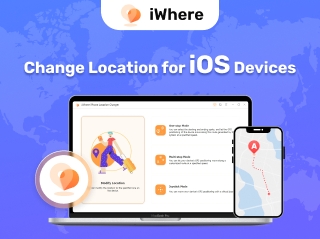Updated on 2024-07-23
4176 views
5min read
Vivillon burst onto the Pokemon Go scene during the Season of Mythical Wishes, joining its adorable pre-evolutions, Scatterbug and Spewpa, from the Gen 6 region. And with its dazzling array of wing patterns, Vivillon sparked a global collection frenzy. But unlocking these vibrant butterflies isn’t as simple as finding them on the map. You will have to understand the Pokemon Go Vivillon map to create a strategy and pinpoint where you can locate them.
Of course, this guide will demystify the Vivillon map concept and explain:
- The world of Vivillon patterns and the specific regions where they can be unlocked.
- how to evolve Scatterbug into its various Vivillon forms, including the crucial role of postcards.
- introduce you to a special tool that empowers you to reach out to those far-off regions and catch those vibrant butterflies for yourself.
So, get ready to embark on your global Vivillon adventure.
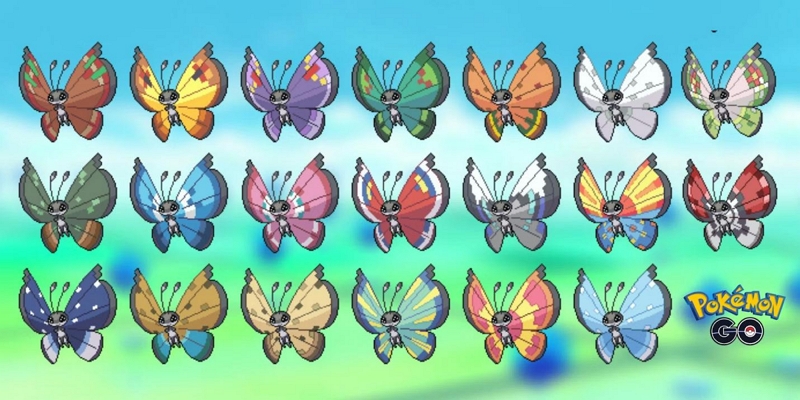
Part 1: What is Pokemon Go Vivillon map?
A Pokemon Go Vivillon map is a unique visual tool that helps trainers track down the Vivillon wing patterns they desire. Here’s what sets it apart from other Pokemon Go maps:
- Regional Focus: Unlike a map highlighting real-time Pokemon spawns, a Vivillon map divides the world into colored regions. Each color corresponds to a specific Vivillon wing pattern.
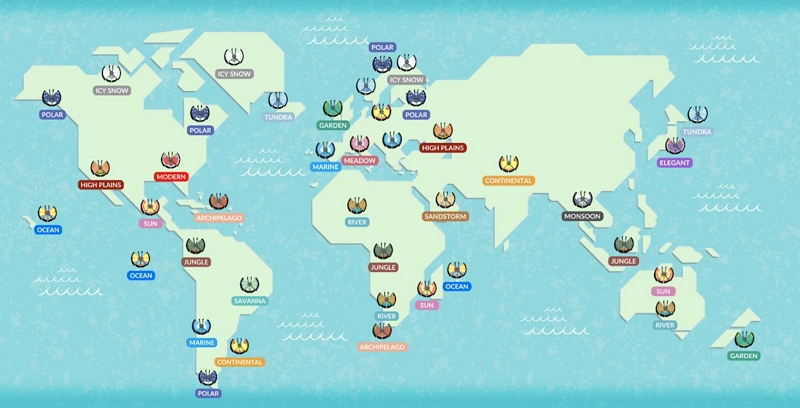
- Not About Spawns: The map itself won’t show you individual Scatterbug locations. Instead, it tells you which regions of the world you need to connect with to unlock the Vivillon pattern you want.
- Collecting vs. Catching: The Vivillon map also informs about your postcard collecting strategy you might have to adapt. See, you’ll need friends from specific regions (or to travel there yourself) to gather the right postcards and trigger Vivillon evolutions.
Part 2: Pokemon Go Vivillon Patterns & Regions
1. Archipelago Pattern
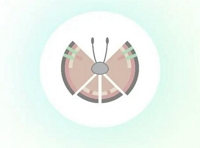
- Appearance: Features vivid reddish and green wings with splashes of light purple.
- Regions: Limited to a few island nations, including Hawaii, the Caribbean, and some other tropical islands.
2. Continental Pattern
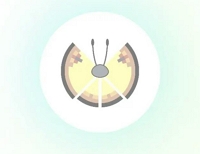
- Appearance: Primarily orange wings with black outlines and white accents.
- Regions: Found in many parts of Europe, Central Asia, and Central East Asia.
3. Elegant Pattern
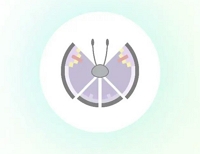
- Appearance: Intricate with violet, black, and pink scales creating a luxurious look.
- Regions: Exclusive to Japan.
4. Garden Pattern
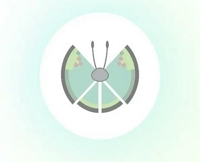
- Appearance: Resembles a lush garden with green and yellow tones.
- Regions: Several regions in the UK, Ireland, and New Zealand.
5. High Plains Pattern
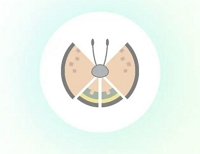
- Appearance: Unique blend of orange, black, and tan scales.
- Regions: Limited to high altitude areas and plateaus in certain parts of the Western United States and Eastern Central America.
6. Icy Snow Pattern
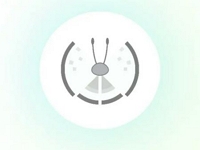
- Appearance: Pale blue and white wings reminiscent of icy landscapes.
- Regions: Found in cold regions like Greenland, Northern Canada, and Northern Europe.
7. Jungle Pattern
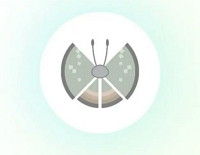
- Appearance: Vibrant green with touches of yellow and orange.
- Regions: Central America, Northern South America, and parts of Southeast Asia.
8. Marine Pattern
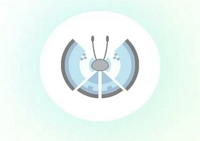
- Appearance: Stunning blue and white pattern inspired by the ocean.
- Regions: Chile, Greece, and parts of coastal Western Europe.
9. Meadow Pattern
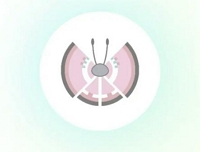
- Appearance: Soft green and yellow reminiscent of blooming meadows.
- Regions: France, Italy, and some other continental European countries.
10. Modern Pattern
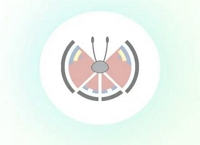
- Appearance: Bold geometric pattern of black, white, and red.
- Regions: Major urban areas in the Eastern United States.
11. Monsoon Pattern
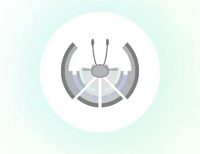
- Appearance: Striking mix of blue, purple, and black.
- Regions: Parts of Southeast Asia.
12. Ocean Pattern
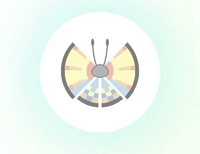
- Appearance: Ocean-inspired with teal and light blue hues.
- Regions: Hawaii, the Galapagos Islands, and some other oceanic locations.
13. Polar Pattern
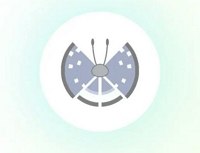
- Appearance: Icy blue and white reminiscent of polar landscapes.
- Regions: Extremely limited to far northern and southern regions like Alaska, Scandinavia, and southernmost parts of South America.
14. River Pattern
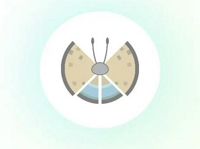
- Appearance: Soft blue and mud-color pattern with subtle white accents.
- Regions: Found near major rivers and water bodies across various continents.
15. Sandstorm Pattern
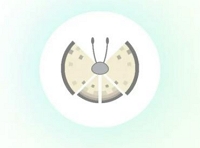
- Appearance: Earthy tones of brown and beige, evoking desert landscapes.
- Regions: Limited to arid and desert regions in the Middle East, North Africa, and parts of Australia.
16. Savanna Pattern
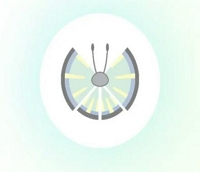
- Appearance: Warm brown and orange with black accents, reminiscent of African savannas.
- Regions: Sub-Saharan Africa, parts of South America, and Australia.
17. Sun Pattern
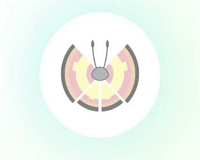
- Appearance: Vibrant yellow and orange with bold black markings.
- Regions: Mexico, southern regions of the Southwestern United States, and parts of the Caribbean.
18. Tundra Pattern
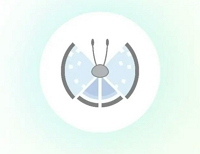
- Appearance: Pale blue and gray hues with striking white patterns.
- Regions: Found in northern regions of North America, Europe, and Asia.
Part 3: How to Get Pokemon Go Vivillon
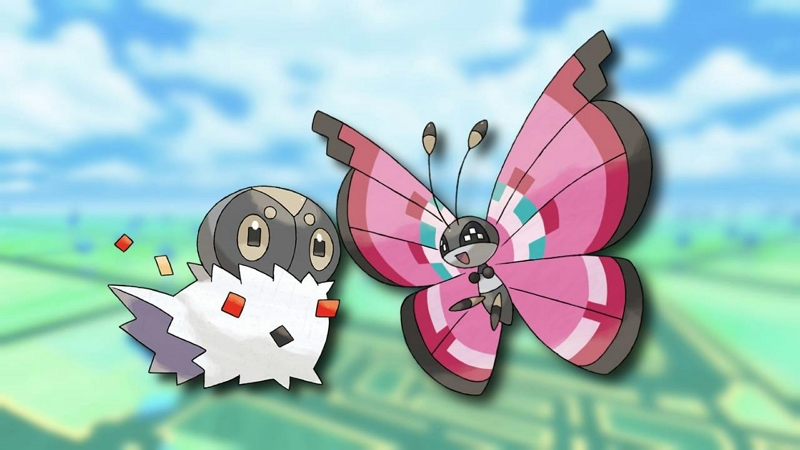
Vivillon’s unique collection will allow you to add an exciting dimension to Pokemon Go; however, the journey from catching Scatterbug to evolving dazzling Vivillon depends on so many factors:
- Your Location: the Vivillon patterns you can naturally encounter are limited to your real-world location.
- Scatterbug candy.
- Postcard pinning.
- Global friendship to access postcards from regions you can’t travel yourself to.
- Patience because obtaining Vilvillon is a long-term project.
Here’s how to go about when it comes to evolving Scatterbug into dazzling Vivillon:
Step 1: Finding Scatterbug. Scatterbug appears in the wild like other Pokemon, but can be more frequent in certain regions. Your current location influences the Vivillon pattern of any Scatterbug you encounter.
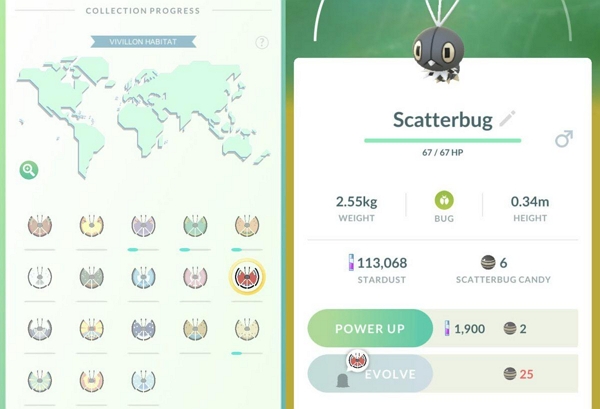
You can also encounter Scatterbug from postcard sent by friends in different regions of the world. This is the key for obtaining Scatterbug tied to Vivillon patterns that you cannot access yourself.
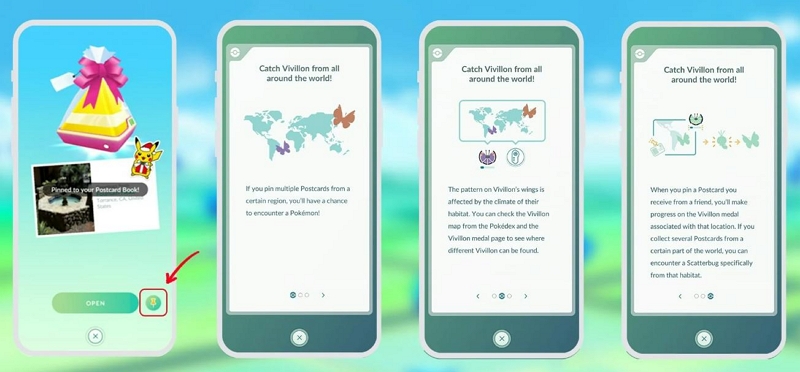
Example: you need to pin a postcard from Hawaii that your friend sent you. This will allow progress to be made on the Vivillon Collectors Medal associated with Hawaii. when you click on the new Vivillon Collector medal from Hawaiian, you will encounter Scatterbug from Hawaiian on your the map.
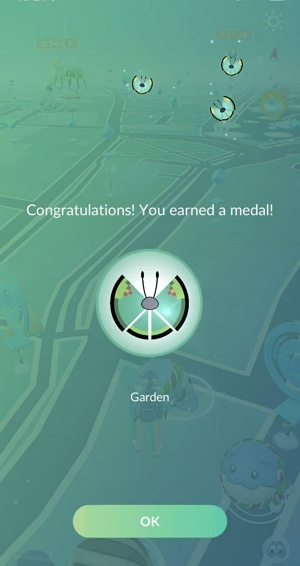
Step 2: Evolve Scatterbug to Spewpa
To evolve Scatterbug into Spewpa in Pokémon Go, you will need 25 Scatterbug Candy.

How to Maximizing Candy:
- Use Pinap Berries when catching Scatterbug to double your catch candy rewards.
- You can also bank Scatterbug via Spotlight Hours or Community Days that feature double catch candy bonuses.
- Set Scatterbug as your buddy to earn candy with every 1 km walked.
Step 3: Evolve Spewpa to Vivillon
To evolve Spewpa into Vivillon, you’ll need to pin postcards from trainers in the region corresponding to your desired Vivillon pattern.
Plus, there’s a specific number of postcards you need to pin from a region to trigger the evolution. In order to evolve Spewpa into Vivillon, you will need an additional 100 Scatterbug Candy.

 Note:
Note: - After acquiring a Scatterbug, the Pokémon’s details screen will indicate the Vivillon pattern that will be acquired upon its evolution.
Part 4: How to get to the location on Vivillon map without walking
The Vivillon map reveals a key challenge: Each stunning pattern is tied to a specific real-world region. To evolve, say, a vibrant Jungle Vivillon, you’ll need to either physically be in Central America to catch Scatterbug OR have dedicated friends from there to send you postcards.
But what if you’re eager to collect them all without the plane tickets or postcards? This is where location spoofing tools like iWhere iPhone Location Changer come into play, allowing you to virtually travel across the globe.
iWhere allows you to teleport your Pokemon Go avatar to any location globally with a single click. Imagine instantly being in Greece to snag Scatterbug for a stunning Marine Pattern Vivillon — that’s what iWhere is made for! But that’s not all:
Movement Modes for Virtual Exploration
Once you’ve teleported to your chosen region, iWhere offers various movement modes to simulate realistic travel within the game:
- One-Stop Route: Perfect for quickly catching Scatterbug in a specific location.
- Multi-Stop Route: Plan a virtual sightseeing trip while collecting Scatterbug across multiple regions.
- Joystick Control: Enjoy the flexibility of moving freely within your chosen virtual area.
Needless to say, iWhere is designed to be user-friendly, even for those who aren’t particularly tech-savvy. Its key features like:
- Quick location switch with one click, no wait no jailbreak.
- Import pre-made routes or export your virtual journeys for future reference within iWhere.
- Custom movement speeds ranging from 1m/s to 50m/s.
- Replay past virtual walks or create a custom historical route to revisit favorite Vivillon hunting grounds.
Follow the steps below to use iWhere to reach Vivillon’s location
Step 1: Install and launch the iWhere iPhone Location Changer on your computer. Then, click the “Start” button.
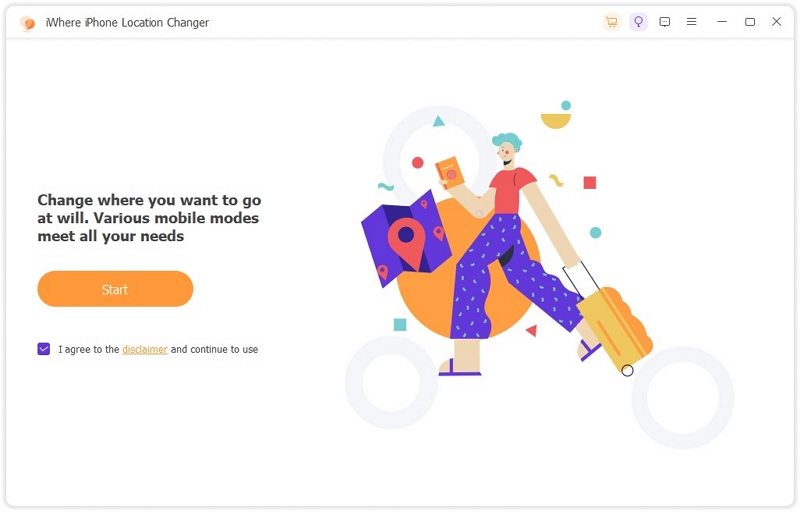
Step 2: Connect your iPhone to the computer and choose Joystick Mode to spoof Pokemon Go location.
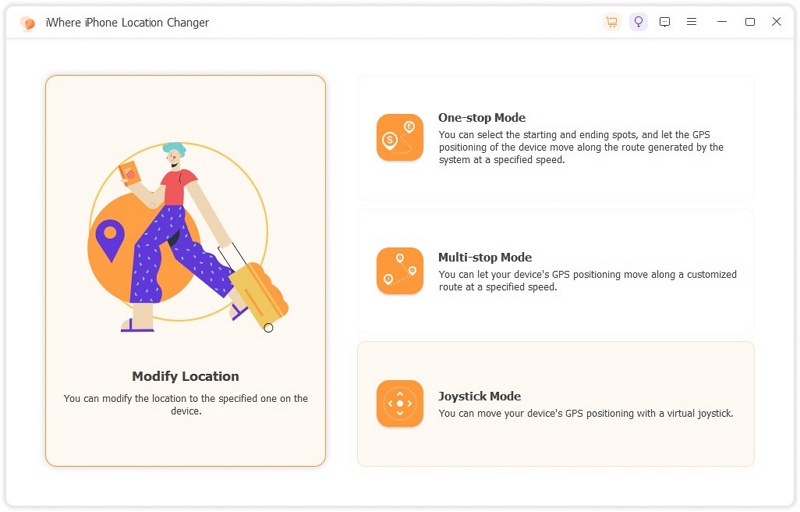
The “Joystick” icon is at the top-right corner, as shown in the image below.
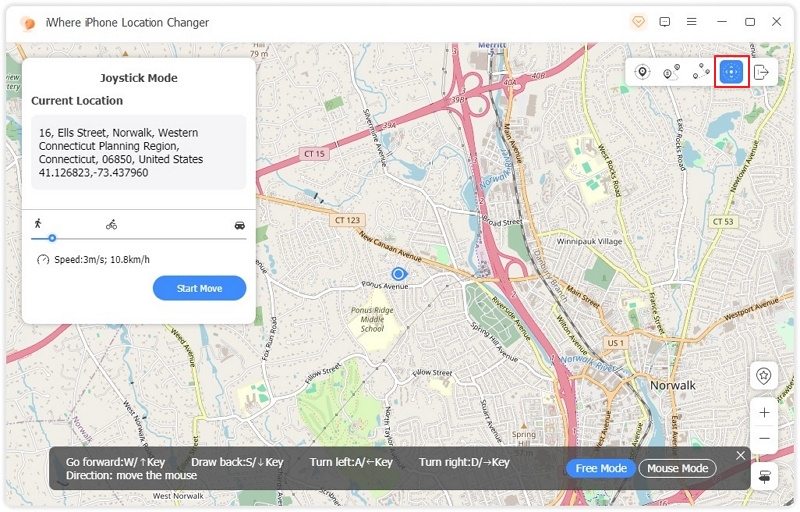
Step 3: After that, you need to select a preferred mode to navigate the “Map” in Joystick mode, as iWhere allows you to use either your computer “Cursor” or “Keyboard”.
- To use “Cursor”, select “Mouse Mode” from the bottom right corner.
- If you prefer your “Keyboard” to navigate the map, choose “Free Mode”. Then, click “Start Move”.
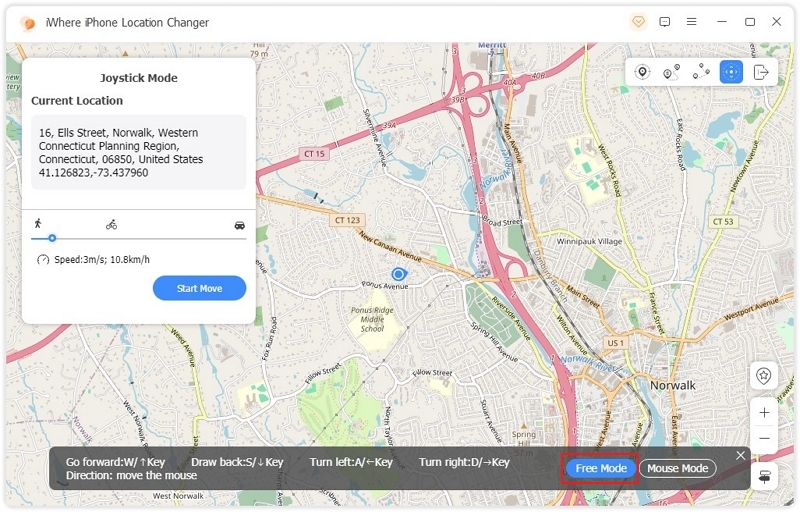
FAQs
How can I trade for Vivillon patterns with players from different regions?
It depends on your choice and comfortability. The popularity of Pokemon Go has ensured one thing, and that is you can find the Vivillon groups on any platform. Here are some ways to consider:
- Vivillon trading groups on platforms like Reddit, Facebook, or Discord allows you to connect with trainers worldwide.
- You can also utilize dedicated trading websites.
- Of course, personal friends and family members can go a long way to help you out.
Are there any special events or promotions that offer rare Vivillon patterns?
Yes! In Pokémon Go, there are various special events and promotions that offer elusive Vivillon patterns. These events typically entail journeying to specific regions worldwide or participating in time-limited challenges.
For example, during the “A Thousand-Year Slumber” event in September 2022, players who ventured to Japan had the opportunity to capture Scatterbug, the bug-type Pokémon that evolves into Vivillon, featuring the exclusive “Elegant” pattern.
Likewise, the “Bug Out!” event in August 2022 showcased increased spawns of Scatterbug with the “Savanna” pattern, usually indigenous to Africa. Besides these region-specific events, Niantic, the developer of Pokémon Go, occasionally launches global challenges that bestow players with rare Vivillon patterns.
It’s essential to note that the availability of rare Vivillon patterns through events and promotions may vary over time. Therefore, it’s advisable to stay informed about the latest news and announcements from Niantic.
Are there any in-game benefits to collecting all the different Vivillon patterns?
While there are no direct gameplay bonuses, Vivillon collecting offers these rewards:
- Pokedex Completion: Essential for dedicated collectors aiming to “catch ’em all!”.
- Personal Challenge: The global nature of the Vivillon collection adds a thrilling challenge for some players.
- Community Connection: Trading and sharing postcards foster a sense of the global Pokemon Go community.
Conclusion
Vivillon’s being region specific encourages you to start a unique type of Pokemon Go adventure. It’s not about simply catching Pokemon, Niantic introduced Vivillon to foster a community and allow you to make friends worldwide. The Vivillon map highlights clearly which regions you’ll need to connect with.
Ideally, you will have to make friends via online communities and social channels — exchange postcards to complete your Vivillon collection. But this easily becomes a long-term project and requires patiences and social skills. This is why we have also mentioned iWhere that allows you to teleport anywhere on the Vivillon map and catch all Scatterbug yourself.
